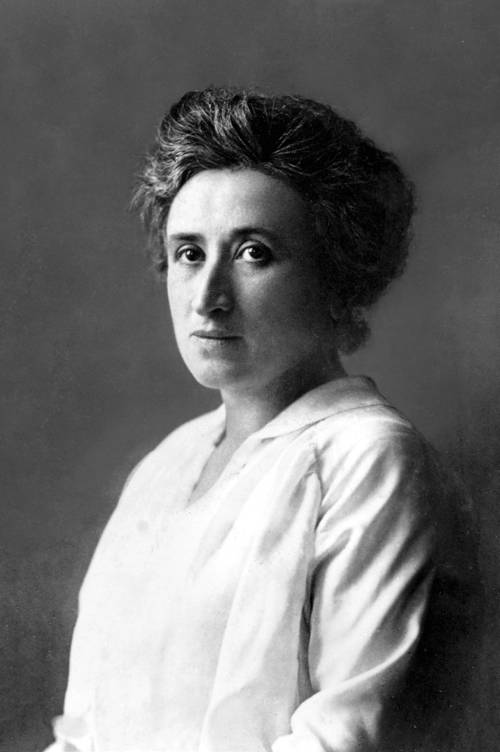
FAQ About Rosa Luxemburg

Who was Rosa Luxemburg?
Rosa Luxemburg was a Polish Marxist theorist, philosopher, and revolutionary socialist who was active during the late 19th and early 20th centuries. She was known for her contributions to Marxist theory and her commitment to socialist activism. Luxemburg was influential in both Polish and German socialist movements and played a significant role in the development of revolutionary socialism.

What were Rosa Luxemburg's major contributions to Marxist theory?
Rosa Luxemburg's major contributions to Marxist theory include her critique of capitalism and imperialism, arguing against the reform-oriented strategies of some socialist parties, and her theory of spontaneous mass action. She emphasized the importance of revolutionary action over gradual reform and critiqued the exploitation inherent in capitalist economies. Her work 'The Accumulation of Capital' is particularly notable.

Did Rosa Luxemburg have disagreements with other Marxists?
Yes, Rosa Luxemburg had disagreements with other Marxists, most notably with Lenin. While both were committed revolutionaries, Luxemburg criticized Lenin's ideas on party organization, democracy, and centralization, fearing that such approaches could lead to authoritarianism. She championed more democratic and grassroots approaches to socialism.

What role did Rosa Luxemburg play in the German Socialist movement?
Rosa Luxemburg played a pivotal role in the German Socialist movement, especially within the Social Democratic Party of Germany (SPD) and later the Spartacist League. She was a leader in the movement advocating for revolutionary socialism and opposed the SPD's support for World War I. Her advocacy eventually contributed to the founding of the Communist Party of Germany (KPD).

What is Rosa Luxemburg's most famous written work?
Rosa Luxemburg's most famous written work is 'The Accumulation of Capital,' published in 1913. In this book, she provides a thorough critique of capitalist economics and emphasizes the exploitative nature of imperialism. Other notable works include her contributions to revolutionary strategy and critiques of reformist socialism.

How did Rosa Luxemburg die?
Rosa Luxemburg died in 1919 during the aftermath of the German Revolution. She was executed after being arrested during the Spartacist uprising, which attempted to establish a socialist government in Germany. Her death marked a tragic endpoint to her efforts to promote Marxist and socialist ideals.

What is the significance of Rosa Luxemburg's theory of spontaneous mass action?
The significance of Rosa Luxemburg's theory of spontaneous mass action lies in its emphasis on the importance of worker-led movements and uprisings. She believed that significant social change could only be achieved through the active participation of the masses, rather than solely through elite leadership or top-down approaches. This theory inspires various grassroots socialist and activist movements.

How did Rosa Luxemburg influence modern socialist movements?
Rosa Luxemburg influenced modern socialist movements through her advocacy for democratic socialism and her critiques of more authoritarian approaches to Marxism. Her emphasis on worker empowerment and democratic participation continues to inspire contemporary socialists who seek to achieve change through active grassroots involvement rather than centralized control.

What did Rosa Luxemburg criticize about the capitalist system?
Rosa Luxemburg criticized the capitalist system for its inherent exploitation and tendency towards imperialism. She argued that capitalism's need to constantly expand markets leads to imperialist ventures, which exploit and oppress lesser industrialized nations and their populations. Her analysis highlighted the social and economic inequalities perpetuated by capitalism.

What was Rosa Luxemburg's role in the Spartacist uprising?
Rosa Luxemburg was one of the leaders of the Spartacist uprising, which took place in January 1919 in Germany. The uprising was an attempt by Marxist revolutionaries, including Luxemburg, to overthrow the postwar German government and establish a socialist state. While the revolt was ultimately suppressed, Luxemburg's leadership and ideas were central to its conception and execution.

Why is Rosa Luxemburg considered a key figure in the history of socialism?
Rosa Luxemburg is considered a key figure in the history of socialism because of her passionate advocacy for revolutionary socialism, her critiques of both capitalism and reformist socialist strategies, and her influence on Marxist theory. Her intellectual contributions and her role in political activism have left a lasting impact on socialist movements worldwide.

What was Rosa Luxemburg's stance on imperialism?
Rosa Luxemburg had a critical stance on imperialism, viewing it as an extension of capitalist exploitation. She argued that imperialism was driven by the capitalist need to find new markets and resources, resulting in oppression and exploitation of colonized regions. Her work helped shape the understanding of imperialism in Marxist theory.

Was Rosa Luxemburg involved in any political parties?
Yes, Rosa Luxemburg was involved in several political parties, notably the Social Democratic Party of Germany (SPD) and later the German Marxist organization known as the Spartacist League, which eventually became part of the Communist Party of Germany (KPD). Her involvement in these parties helped shape their strategies and ideological directions.

How did Rosa Luxemburg's theories differ from Lenin's?
Rosa Luxemburg's theories differed from Lenin's primarily regarding party organization and the role of mass movements. Luxemburg advocated for a more decentralized, democratic approach, fearing the authoritarian tendencies of a tightly controlled party as supported by Lenin. She emphasized spontaneous mass action rather than centralized control.

What legacy did Rosa Luxemburg leave in socialist theory?
Rosa Luxemburg's legacy in socialist theory includes her critical analyses of capitalism and imperialism, her theories on spontaneous mass action, and her fierce advocacy for democracy within socialist movements. Her writings continue to be studied by contemporary Marxists and socialists seeking democratic and non-authoritarian pathways to social change.

Why did Rosa Luxemburg oppose World War I?
Rosa Luxemburg opposed World War I because she viewed it as an imperialist war driven by capitalist states competing for resources and power. She believed that socialists should not support such a war but rather focus on promoting peace and international worker solidarity against imperialism and capitalism.

Did Rosa Luxemburg have any famous quotes?
Yes, Rosa Luxemburg is known for several famous quotes, one of the most notable being, 'Freedom is always and exclusively freedom for the one who thinks differently.' This quote reflects her commitment to freedom of thought and expression, even within socialist movements. Her words continue to resonate with advocates for democracy and individual rights.

Where can I learn more about Rosa Luxemburg's writings?
You can learn more about Rosa Luxemburg's writings through various academic publications and archives. Her works such as 'The Accumulation of Capital' and 'Reform or Revolution' are widely available in libraries and online platforms like Marxists.org, which provide access to her extensive body of work.

What did Rosa Luxemburg contribute to feminist theory?
Rosa Luxemburg's contributions to feminist theory are indirect but significant. As a woman in the primarily male-dominated spheres of Marxist theory and revolutionary politics, she broke barriers and serves as an inspiration for female empowerment and equality. Her ideas on political freedom and social justice are also applicable within feminist movements.
